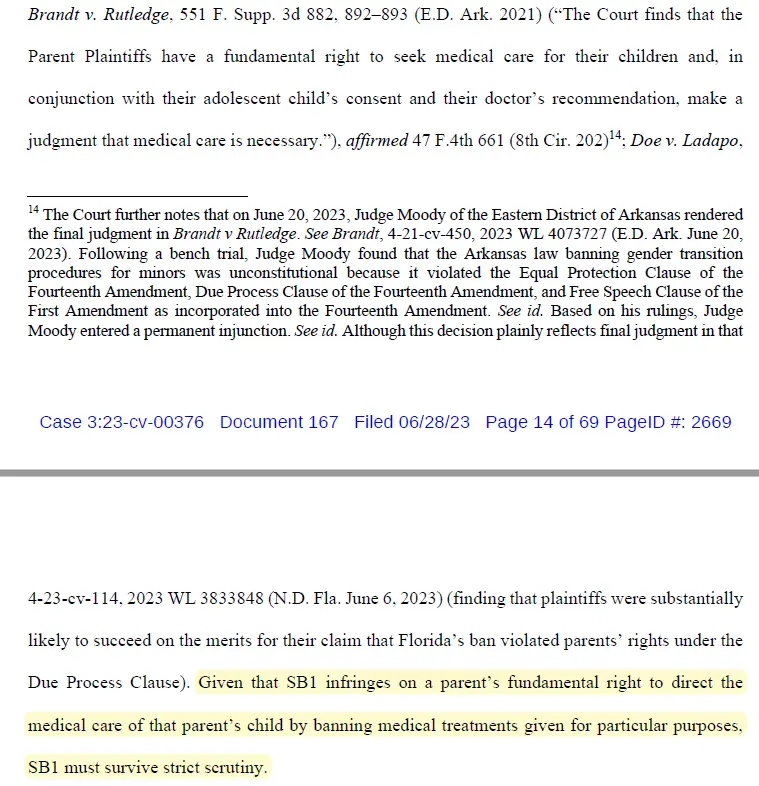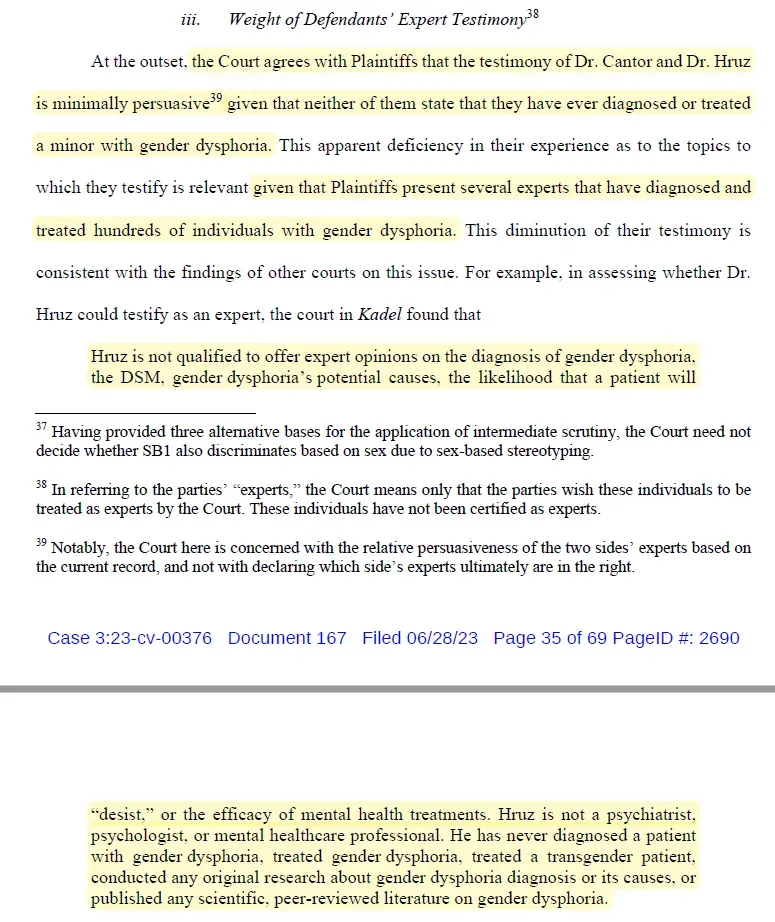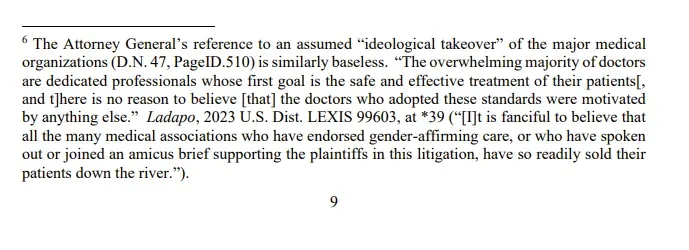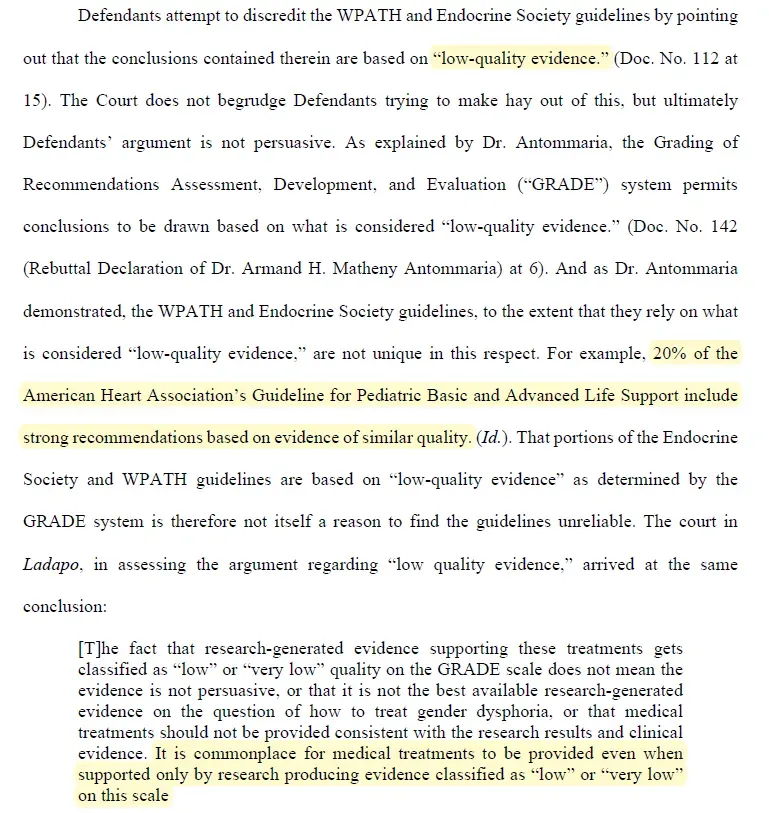Within hours of one another on Friday, federal courts in Tennessee and Kentucky handed down judgments that block the implementation of bans on gender-affirming care. Both federal judges found the bans to likely be in violation of the Constitution. These decisions marked the fifth and sixth victories for transgender care this year, as the judiciary continues to rule that gender affirming care bans unconstitutionally violate due process and equal protection under the law.
Diving into the details, these rulings, like their predecessors, dissect the arguments against transgender rights, systematically addressing and countering the rhetoric that Republican legislators have uncritically accepted. They ultimately rule that gender affirming care bans have no legitimacy under constitutional scrutiny.
Particularly significant is the lack of partisanship in these rulings: the presiding judge in Tennessee, Judge Eli Richardson, was appointed by former President Donald Trump, as were judges in Indiana and Alabama. Richardson resoundingly dismissed claims that gender-affirming care is either experimental or detrimental to the welfare of transgender youth. Moreover, the court recognized and underscored the abundance of medical evidence in favor of gender-affirming care and struck down Tennessee’s “medical” witnesses as not credible.
These court decisions signal a mounting legal consensus that legislation aiming to limit gender-affirming care lacks a constitutional basis. States that have attempted to pass such laws now sit at a dismal 0-6 record in defending these laws in court.
Here are the most important sections of these recent decisions:
Parents Rights Supports Gender Affirming Care’s Constitutionality

Anti-trans political groups often claim that “parental rights” are the focal point of their policy decisions, and yet when passing gender affirming care bans, they have often had to tie themselves into knots to justify why parental rights does not apply when it comes to the medical care of trans youth. Republican Senator Yoder in Florida, for instance, backtracked specifically on parental rights when it came to a gender affirming care ban that he presented in the state. In Kentucky, Rep. Stevensen pointed out that the gender affirming care ban there “tramples all over parental rights.” In fact, one of the Republicans, Rep. Moser, to vote against the ban in Kentucky cited parental rights for her decision.
Federal judges in all of these cases have lent their weight to the importance of parental rights and decided that “parental rights” issues favor transgender plaintiffs. They upheld that the right of parents to make informed decisions about their children's medical care is fundamental, meriting strict scrutiny. With this heightened judicial standard, any legislation that curtails such rights must be narrowly tailored and supported by an exceptionally persuasive rationale. The courts discerned that the sweeping nature of the gender-affirming care bans failed to meet these criteria. Consequently, the judges concluded that the bans infringe on plaintiffs’ rights to due process.
Anti-Trans Experts Are Not Credible

Repeatedly, federal courts have analyzed the credibility of Republican “experts” and found them to be severely lacking in credibility. Recently in the Arkansas ruling, a federal judge determined the expert witnesses that Arkansas put forward were not credible and likely presenting evidence grounded in [religious] ideology rather than science. In fact, many of the experts who testified in both Arkansas and Tennessee were recruited at an Alliance Defending Freedom seminar in Arizona; the court in Arkansas noted that the Alliance Defending Freedom is an organization “committed to protecting God’s design for marriage and family,” undermining the witnesses credibility.
The Tennessee court found similarly with respect to the experts that the state produced, pointing out that they have never diagnosed nor treated gender dysphoria in transgender youth. The state had no psychiatrists or mental healthcare professionals testify against gender affirming care and could not produce a single credible witness to state that the care was harmful to trans youth. Looking at the history of all witnesses medical practices, the court determined that none of the witnesses had credibility, especially when stacked against the weight of 29 major medical organizations supporting care.
No Evidence Of “Ideological Takeover” Of Medical Organizations

Repeatedly, anti-trans witnesses and legislatures passing gender affirming care bans have argued that the reason every major medical institution supports gender affirming care is because they have been “ideologically taken over,” rather than genuine concern for the medical care of their patients. Leor Sapir from the Manhattan Institute, who often testifies at these bill hearings, states, for example, that US medical organizations are “ideologically captured” and that they “suppress scientific debate.” Matt Walsh, a major anti-trans advocate, has tweeted that the American Academy of Pediatrics is “ideologically captured” and “an activist group masquerading as a medical organization.”
In the Kentucky ruling, the judge resolutely dismissed as baseless an identical claim made by the state’s Attorney General that medical organizations are ideologically captured. Instead, the judge held that the state failed to provide any credible evidence to suggest that these organizations were driven by anything other than patients' best interests. Reinforcing this stance, the judge cited a parallel ruling from a Florida court, asserting that “the overwhelming majority of doctors are dedicated professionals whose first goal is the safe and effective treatment of their patients.”
In determining the credibility of medical organizations, the Kentucky judge states:
The Commonwealth offers no evidence that Kentucky healthcare providers prescribe puberty-blockers or hormones primarily for financial gain as opposed to patients’ well-being, and the Court makes no such presumption.
“Low Quality Evidence” Is Misleading

The latest deceptive claim to make the rounds in anti-trans circles is the claim that gender affirming care is only supported by “low quality evidence” and therefore should be banned. Fox News, for instance, touted Republican Representative Dan Crenshaw’s questioning of Dr. Meredithe McNamara over not having “high quality evidence” for gender affirming care. The anti-trans organization Genspect, which played a hand in drafting the Florida gender affirming care ban, likewise stated that “there is no high quality evidence” supporting the use of gender affirming care.
These claims rely on something called the Grading of Recommendations, Assessment, Development and Evaluation (GRADE) System. The court in Tennessee, as in other courts, found that this system is inappropriately applied to medical treatments - only one in ten medical treatments are based in “high quality evidence.” That is because in order for evidence to be considered “high quality” in this system, it must be done via randomized clinical trials - something not possible for gender affirming care due to the obviousness of its effects as well as to the ethical problems around giving transgender patients placebo pills.
The judge in Kentucky concurred, finding that the same treatments are also based in “low quality evidence” when used for procedures that are NOT prohibited by these procedures, stating:
“Based on the evidence submitted, the Court finds that the treatments barred by SB 150 are medically appropriate and necessary for some transgender children under the evidence-based standard of care accepted by all major medical organizations in the United States.”
--30--
Written by Erin Reed. Cross-posted from the Erin in the Morning.







